Yesterday I returned from a four-day wine tour through Rheinhessen. Today, Carl Zuckmayer's memoirs "Als wär's ein Stück von mir" are on my desk. Inspired by the wine village of Nackenheim - the writer's birthplace - I look in my library for "Fröhlicher Weinberg", the stage play in which winegrowers, boatmen and petty bourgeois are portrayed in a socially critical way. I don't find the book, but I leaf through the author's biography, which he wrote in 1966, ten years before his death. There I find a beautiful description of what I encountered, experienced and felt intensely for four days in a region I knew little about: a memorable landscape with many vines.
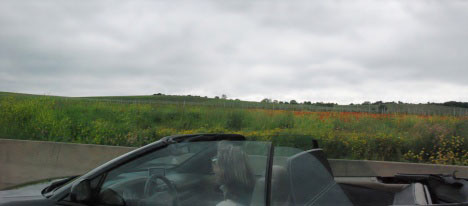 |
| On the road in Rheinhessen - through green meadows and hills covered with vines |
The area shows an extremely simple, sober character in its strong, sunny fertility. The vines stand neat and well-behaved, the fruit trees arranged in rows, all the land is farmland, and only the reddish skin sheen of the earth betrays something of its secret hot-bloodedness, of its chastened temperament." Yes, it is precisely this landscape that has fascinated me, although, as Carl Zuckmayer writes, it has remained "serene and undemanding" in the face of historical agitation for centuries. As a wine lover, one hardly travels to a wine region because of the landscape, but rather to get to know the wines and winegrowers, to visit wineries, to enjoy wine in authentic places. For this reason, we too travelled to Rheinhessen, took our rooms in the "Himmelacker" of the Storr winery in Dautenheim and visited five of the most famous wineries in the area.
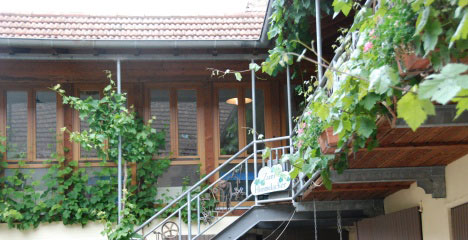 |
| "Zum Himmelacker" at the Storr winery in Dautenheim. A typical winegrower's hotel |
I admit, more than all these long ritualised farm visits, two things touched me: the landscape and the - mostly nightly - encounters with winemaker father "Storr" - the "old gentleman" at the winery - who knows how to describe the everyday life of a Rhine-Hessian winemaker - over a glass of wine - aptly, succinctly, gnarly, but also cunningly.
On the last evening, it is already after midnight, we return from a tasting to the vintner's hotel. Father Storr is still on his feet. We sit down at a table in the large courtyard - under the open sky - and open two more bottles we brought with us: real Burgundies. The winemaker's comment: "not bad - well done - the second wine was the better....". But then he disappears into the cellar, with the remark: "I'll get something else that nobody really wants to drink anymore" and he comes back with a dusty 0.5 litre bottle - without a label. "Let's try it!". Brave, I think, to serve up another local wine after the two rather highly rated Burgundies, a red that can't hide a certain age. We put our noses, which have been particularly tested by more than 25 wines this evening, into the glass. We take small sips, try to let the wine circulate in our mouths, to hold it in our palates, to determine the grape variety, the vintage and, above all, the pleasure. Almost hopeless, at this time, under these circumstances.
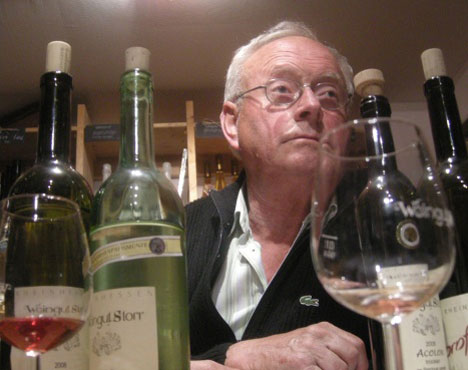 |
| Father Storr at one of the nightly wine encounters |
Yet, I am somehow moved, affected, caught up in my love for wine. Not in the way of the usual "wow" when there is something really great in the glass and the winemaker, with whom we were guests just an hour before, would have exclaimed: "really cool stuff", no, impressed by the presence, the honesty, the sustainability of a "small wine" that clearly shows the signature of the winemaker, the traces of the soil, the expression of a landscape, the will to make something very special. The wine is "only" a Portugieser. But a very special one. In 2002, on the occasion of the premiere of the dance performance "Die gefiederte Schlange" (The Feathered Serpent) by Michaela Isabel Fünfhausen, which premiered in the winery's theatre barn, it was specially pressed, bottled, labelled and offered to the audience.
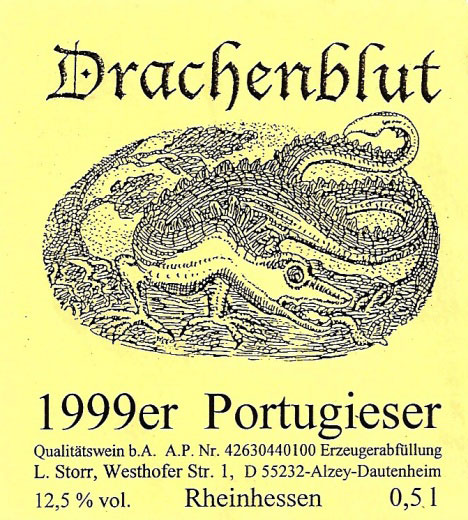 |
| Wine label |
I suddenly feel, experience, that a wine can not only bring pleasure (to be rewarded with points), but in the best case also conveys a piece of culture that can be experienced. The quarter of an hour we spent drinking this wine at the end of our Rheinhessen trip has become a highlight for me. I suspect the winemaker sensed this, because at the end he gives me the precious label, which is not stuck on the bottle but has been lying next to the last bottles as a memento, with the words: "cherish it!". This I will do, because it remains for me the symbol of an encounter, not primarily with precious wines and highly praised winemakers, but with a landscape in which - good and also not so good - wine is made. With a landscape and the everyday life of people embedded in it, including vintners, who are shaped by the landscape. Even on the drive from Mainz to the wine region I perceive this - probably unconsciously - because I snap tirelessly from the car, snap and snap, picture after picture, capturing impression after impression.
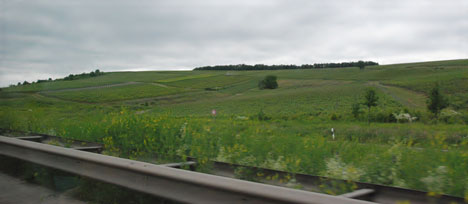 |
| On the road: click% click% click. Impressions captured |
This at a time when I still have no idea whether I will ever write anything about this trip. But now, after the trip, it is clear to me: it is the landscape that is to be the subject of the column. I browse the relevant websites and read: "The peculiarities of Rhine-Hessian wines result from the interplay of winemaker, soil, climate and relief. That's exactly what I took away from Rheinhessen and am now trying to put into words. What I could previously only define geographically, the triangle between Worms, Mainz and Bingen, so to speak, has become a "wine country" for me. Not primarily because of the wines, but rather because of the peculiarity of the landscape, framed by the forested low mountain range, characterised by green hills and plateaus planted with vines and often dominated by the elegant modern windmills used to generate energy.
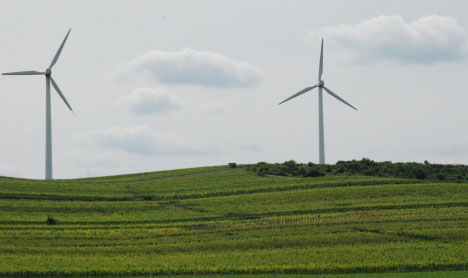 |
| Vines% Vines% dominated by elegant modern "windmills". |
And then the contrast on the Rhine, the Rhine front, with its steep slopes of sandstone, limestone and slate, the "red slope" of red clay slate. Oppenheim, Nierstein, Nackenheim. Precisely where the "merry vineyard" lies, to which Carl Zuckmayer set a literary monument. The model for a fictional plot was the Gunderloch vineyard, where the Hasselbach family is already in its seventh generation. Where little Anna-Stefanie is lovingly looked after by her grandmother, even when wine lovers - almost like intruders - arrive unannounced.
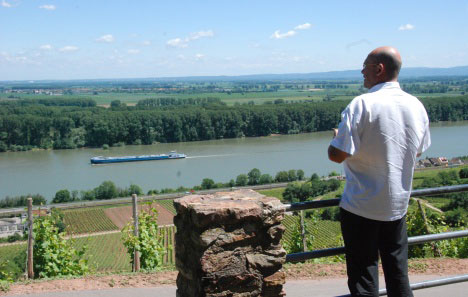 |
| In the "red slope" high above the Rhine |
Only when you stand at the top, high above the Rhine, do you understand what Carl Zuckmayer once wrote: "To be born on a stream, to grow up in the spell of a great river, is a special gift.... It is the streams that carry the countries and keep the earth in balance.... To be in the stream is to stand in the fullness of life."
Sincerely
Yours/Yours